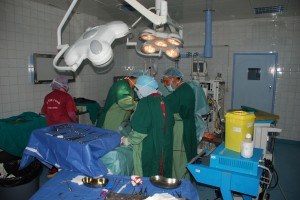By Sami Zaptia.

London, 20 February 2018:
The reform of Libya’s ailing health sector is moving ahead, Dr Samir Sagar, head of the National Centre for Health System Reform (NCHSR) said.
Speaking to the Libya Herald, he confirmed that a number of steps had already been taken in the short time since the reform body was created.
These include the launching of health insurance, the formation of a health council, a health accreditation council, reforming the medical supply organization and the official medicines list.
The Health Insurance Fund (HIF) was launched on the recommendation of the NCHSR through a PC/GNA decree (854) in September 2017 and as a first step health insurance was launched for the education sector state employees with a view to roll it out for all Libyan citizens.
The formation of an independent Health Council is also forthcoming to act as the governing body for the health sector. Previously the Medical Syndicate (Union) used to carryout this function, which was a clear conflict of interest in representing both a potentially aggrieved patient while at the same time defending the medical profession.
A new Health Accreditation Council is also about to be launched. Previously, there was no monitoring or accreditation of health facilities in Libya. Private health clinics used to operate like any commercial entity with no specific health standards or control by any medical body.
The state Medical Supply Organization (MSO), which purchases a large part of medicines on behalf of the state will also be reformed. This body has historically been granted huge procurement budgets of US$ 300 to 500 million per annum. It has been accused of being corrupt and inefficient and of partly conspiring in creating medicine shortages over the decades.
Finally, the official Standard/Essential Medicine List which guides state procurement of medicines will be reviewed. The review of this list has been long-winded as vested years over the decades have resisted their brands or varieties being dropped from it.
More broadly, some version of PPP agreements to operate Libyan hospitals similar to the 2008 agreement signed by the Qaddafi-regime with South African-based Healthshare to run the Al-khadra Hospital are also being considered by the NCHSR.
The NCHSR was was established through decree 255 in March 2017 issued by the Faiez Serraj Presidency Council /Government of National Accord to coordinate national efforts and international backing to reform and modernise the Libyan health system. It was launched in October 2017 by Faiez Serraj at a Tripoli event.
https://www.libyaherald.com/2017/10/02/serraj-spells-out-reforms-needed-by-libyan-healthcare-system/
Headed by Samir Sagar, the NCHSR operates in collaboration with the Health Ministry, and springs out of the Libya Health System Strengthening Programme (LHSS), set up between the Libyan authorities and the European Union.
The NCHSR’s goals are to:
- Restructure the health system;
- Ensure full funding for a service that is free to patients at the point of use;
- Involve the private sector;
- Have a healthcare service in line with international standards;
- Decentralise;
- Have a service where health workers, whether in the private or public sectors, are properly paid for their work;
- Develop a master plan to achieve universal health care in Libya.
The NCHSR continues to work on a wide range of health reforms which will continue to be unveiled throughout 2018 and beyond as and when they are complete.
The extract of the interview with Dr Samir Sagar head of the NCHSR was conducted as part of a full commercial report on the Libyan health sector written for an international client.







